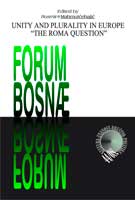THE NATIONAL AWAKENING PROCESS AND THE ORTHODOX ALBANIANS
THE NATIONAL AWAKENING PROCESS AND THE ORTHODOX ALBANIANS
Author(s): Nexhmedin SpahiuSubject(s): History
Published by: Međunarodni forum Bosna
Keywords: Albanian Orthodoxy; Greek Nationalism; Christianity among the Albanians; the Ottoman Empire,The Orthodox Albanian Diaspora; Albanian National Rebirth; the new Albanian State
Summary/Abstract: Having become an atheist state in 1966 – the only one in the world – the fall of communism in 1991 found Albania without clergy. While the Muslim and Catholic communities resolved the issue by “importing” imams and Catholic priests from Kosova, Macedonia, and Montenegro, finding Orthodox Community clerics was more problematic. The first post-communist President of Albania, Dr. Sali Berisha, grudgingly decided to accept a Greek bishop – Dr. Anastasias Janullatos – as the head of the Autocephalous and Independent Albanian Orthodox Church (1992 – the present). Even though this position would have been much coveted by Albanian Orthodox bishops from the Diaspora, the Albanian President was forced to make this decision for a number of political reasons. If we exclude the former Yugoslavia, which had already (1991) been engulfed by the war between Serbia and the rest of the federal units, Greece is Albania’s only land-border neighbor. Around 15% of the Albanian population took refugee in Greece. Consecutive Greek governments, run by the New Democracy Prime Minister Konstantinos Mitsotakis (1990-1993) and PASOK Prime Minister Andreas Papandreou (1993-1996) used this fact to apply strong political pressure on Albania, imposing certain political actions on the newly open Albanian state, such as the appointment of a Greek bishop as the head of the Autocephalous and Independent Albanian Orthodox Church. The attitude of Greek governments has been to attempt the hellenization of southern Albania, which was interrupted by the recognition of the Autocephalous and Independent Albanian Orthodox Church in 1937. President Berisha and the Albanian elite feared that this might lead to the disintegration of the country, but they were not able to do anything about it. Part of the Albanian elite in Tirana still fears that this may have a critical impact in the long term, especially after resolution of the Kosova issue, when a change in the nature of the Albanian nation is to be expected. Whether there are real grounds for these fears is the topic of this paper.
Journal: Forum Bosnae
- Issue Year: 2008
- Issue No: 44
- Page Range: 302-323
- Page Count: 22
- Language: English
- Content File-PDF

